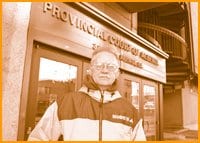The Alberta Crown has stayed its last found-in charge from the Goliath’s raid, saying it’s no longer in the public interest to pursue the case. (The case against owners and managers of the bathhouse is a different matter, though; its charges are still going strong.)
Police charged Terry Haldane with being found in an illegal bawdyhouse after they raided Calgary’s only gay bathhouse on Dec 12, 2002. Canada’s Criminal Code says a bathhouse becomes an illegal bawdyhouse when “indecent acts” occur on the premises; it does not define what counts as an indecent act.
In the days following the raid, police charged a total of 12 other patrons as found-ins. The mostly married men promptly took the ‘alternative measures’ route to avoid the public court process. But Haldane refused to take responsibility for an act he says shouldn’t be a crime in the first place.
“Somebody has to fight back,” he told Xtra West last year. The police cannot be allowed to keep raiding gay spaces and calling them indecent.
Haldane pleaded not guilty and vowed to fight the charge.
He was still fighting it when he got word of the stay last week.
David Torske, the Alberta crown counsel assigned to the case, says he stayed the charge because it was no longer in the public interest to prosecute.
Haldane “was simply charged as a found-in, which is on the low end of the spectrum,” he says. While someone convicted of keeping a bawdyhouse could get up to two years in jail, found-ins are more likely to get a fine.
That was the case here, Torske says. “We weighed that against a three-week trial” and decided to stay the charge.
The fact that Haldane and his lawyers had already given notice of their plan to challenge the bawdyhouse law itself-and take it all the way to the Supreme Court of Canada if they have to-only played an indirect part in his decision-making process, Torske says.
The case looked like it was going to require even more court time and expense, he explains. Add that to the resources he’s still pouring into the accused keepers case, and the matter simply wasn’t worth pursuing anymore.
“I’ve already spent I don’t know how many weeks on the keepers trial,” Torske notes. To go through that again in preparation for a found-in charge “seemed to be excessive.”
Haldane says he was “absolutely livid” when he heard the news.
“After two years, they think they’re taking their bat and ball and going home?” he asks. “Well, they’re wrong. I’ve gone through too much shit for this.”
Haldane says he still fully intends to challenge the law under which he was charged-even though he’ll have to mount a new, separate court case to do it now.
“I have no intention of letting go,” he says. “There’s a point to be made here.”
As for the accused keepers, Darrell Zakreski and his employees Lonnie Nomeland, Gerald Rider and Peter Jackson are scheduled to return to court for part two of their trial beginning Feb 2.
In part one of the trial, Judge Terence Semenuk ruled that police did nothing wrong in their steps leading up to and including the Goliath’s raid. Now, the accused keepers will have to prove that what police witnessed was not indecent.
Torske says he’s not about to stay those charges. That case is still going ahead, he says.
Though there is a chance he might reconsider, he notes, if his research suggests that the community at large might tolerate gay sex in a bathhouse.
-With files from Gareth Kirkby

 Why you can trust Xtra
Why you can trust Xtra


